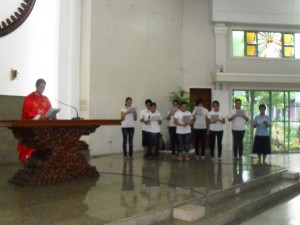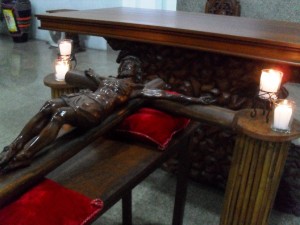 (The following is the homily of Fr. Miguel Lambino SJ on Good Friday, March 29, 2013 at the Good Shepherd Convent, 1043 Aurora Blvd., Quezon City.)
(The following is the homily of Fr. Miguel Lambino SJ on Good Friday, March 29, 2013 at the Good Shepherd Convent, 1043 Aurora Blvd., Quezon City.)
Good Friday is not primarily about suffering and death. Primarily, Good Friday is about the fidelity of loving service. As a consequence of that faithful love, suffering and even death are freely chosen, and willingly born. Bahagi ng pagmamahal ang pasakit. Ito ay di maiiwasan.
I would like to invite us to reflect on the suffering and death of Jesus from the perspective of his faithful love for us. We ask the Spirit of the risen Lord, the Spirit that dwells in us, to lead us to a deeper understanding, appreciation, and appropriation of God’s word to us this Good Friday. Let us take a long, loving look at Jesus on the cross.
1. We look at Jesus on the cross. This is no way to die. This death is the result of a rigged hearing before the Sanhedrin; it results to torture and a humiliating death of a criminal. Crucifixion is no way to die. It is the most humiliating death inflicted on a criminal.

Let us resist this kind of evil. This is no way to die.
2. We look at Jesus on the cross. What do we see? We see the fidelity to loving service. We see freedom to choose to be faithful. We see how much God loves us. God decides to love us even unto death. This manifestation of love answers our need to be loved. No one loves us as much as God loves us. “Even if a mother forget her child, I will never forget you.” It gives us a sense of worth and dignity which can never be lessened by any human pain and suffering.
 What is Good about Good Friday? In and through Jesus’ free decision to be faithful to loving us even unto death, we see how much we are loved.
What is Good about Good Friday? In and through Jesus’ free decision to be faithful to loving us even unto death, we see how much we are loved.
Let us open our hearts to receive God’s love. Let us allow that love to transform us – the way we look at ourselves, the way we look at life and the world.
3. We look at Jesus on the cross. And we ask ourselves, “How do I deal with my own pain and suffering in life? What is my attitude towards death?”
There are different kinds of suffering. Suffering brought about by our human frailty [we make bad decisions, we get sick, we grow old]. Suffering brought about by other people [injustice, violence, oppression]. Suffering out of fidelity to love. Suffering inflicted upon us, suffering we freely choose to bear.
There is a suffering we need to resist. There is a suffering we freely choose because it is a consequence of love.
We need to qualify what suffering we endure. Let it be out love. Without love, even if I offer myself to be burnt as an offering, I am nothing.
 Let us bear our suffering with dignity. Poong Nazareno sa Quiapo. A devotee was asked, “Does this devotion lead to a view that it is alright to suffer, because Jesus suffered?” “No,” the devotee answers, “but Jesus teaches us to bear our suffering with dignity. Look at the way he carries his cross. With dignity.”
Let us bear our suffering with dignity. Poong Nazareno sa Quiapo. A devotee was asked, “Does this devotion lead to a view that it is alright to suffer, because Jesus suffered?” “No,” the devotee answers, “but Jesus teaches us to bear our suffering with dignity. Look at the way he carries his cross. With dignity.”
Secondly, what death or deaths do I have to undergo, in order for me to move toward Easter. Toward new life.
As Ronald Rolheiser says, Good Friday has to do with deaths we have to undergo so that we can have the new life of Easter. Death to expectations – in relationships. Death to regrets – living in the past. Death to clutching to what was, what may have been – youth, unfulfilled dreams. Let go. Let God lead us to Easter.
With Paul, we pray: “may Christ find a dwelling place of faith in our hearts, may our lives be rooted in love. So that we may better understand how much God loves us.” Let us be grateful that we are loved this way. Let us open our hearts to receive that love. Let it transform our hearts, our minds, the core of our self, the way we live. Let us allow love to lead us to bear our suffering with dignity, and live life more abundantly.
